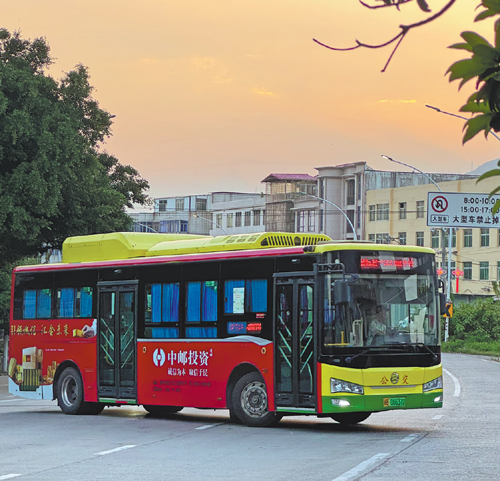In praise of slower pleasures
Eschewing planes and trains, some travelers are using buses to make the journey to their destination, Wang Qian reports.

In an era dominated by high-speed trains and budget flights, a growing number of young travelers are redefining exploration by opting for slow, immersive journeys via public bus. The trend, driven by a desire for deeper cultural engagement and cost-effective travel, is reshaping how some among the younger generation experience the country's vast landscapes and diverse communities.
Most people would take a three to four-hour flight or the high-speed train to travel from Beijing to Hong Kong, but 22-year-old Shen Tie, a journalism student and self-proclaimed bus enthusiast, instead opted to take 120 buses, stopping at more than 3,100 stations on his winding 13-day journey along the public transit network in December, at a cost of 2,800 yuan ($389).
Shen's fascination with buses began in kindergarten, when he would beg his parents to ride loops around his hometown of Jinzhou in Liaoning province instead of napping. "It's a niche hobby," he says, contrasting it with mainstream pastimes like sports or binge-watching dramas.
By middle school, he was plotting solo intercity trips, starting with a bus ride from Shenyang to Fushun in Liaoning in 2018. "It's about the experience, lingering in the street and observing everyday life," he says.
Now a junior at the Yantai University in Shandong province, Shen credits the extensive local rural-urban bus network for deepening his passion. "In Liaoning, there are few routes between cities but here, you can travel from Yantai to Weihai in Shandong for just 3 yuan," he says. His first viral video in March 2024 documented his bus trip, and unexpectedly resonated with thousands on social media. "It motivated me to keep sharing these journeys," he says.
Shen's ambitious Beijing-Hong Kong trek required days of planning. Without relying on navigation apps, he pieced together routes using map software, improvising when roads dead-ended or schedules shifted. "If a bus line was canceled, I'd detour west or backtrack to find alternatives," he says.
Winter made his trip more alluring, with the barren landscapes of North China gradually giving way to the tropical greenery of South China, a visual feast Shen documented from his favorite spot on the bus — the front row.
"I didn't visit famous sites recommended by social media influencers. For me, the journey itself was the destination," he says.
Apart from logistics, Shen's trips are a study in the regional diversity. He documents how bus designs shift from Beijing's Foton models to Shandong's Yutong buses, while dialects — Shanghainese, Cantonese, Hokkien — become markers of place. "I've been recording station announcements since middle school. It's like collecting stamps," he says.
His encounters with drivers and villagers also reveal unexpected connections. Once, a bus driver recognized Shen from his viral videos, because it was his bus that Shen had taken by day.
The 22-year-old's unconventional approach attracts criticism. "People ask why I waste time instead of taking high-speed trains or planes," he says. "I'm not rushing to check off landmarks. I get immersed in the rhythms of ordinary life — the same way others spend a day sightseeing."
For Shen, buses are both transportation and cultural lens. "Half the appeal is the vehicles; the other half is the humanity you witness," he says.
He is planning a west-east route from Qinghai Lake in Qinghai province to Shanghai this summer, and is prepping more than 100 bus lines. His advice to aspiring bus travelers is to travel light, research schedules, and embrace spontaneity. "Always have a plan B — and ask residents if maps fail. They know best."
For 20-year-old Ye Shubo, a chemistry major at Nanjing University in Jiangsu province, bus travel is more than a mode of transportation. During his 12-day journey from Hangzhou, Zhejiang province, to Lhasa, Xizang autonomous region, Ye took more than 60 buses and covered nearly 4,000 kilometers, spending about 7,000 yuan (including accommodation, food, and tickets).
"By bus, you see the gradual shift from bustling cities to remote villages and snowcapped mountains," he says.
Despite its appeal, bus travel isn't without its hurdles. Ye remembers a mishap in Xuancheng, Anhui province, where the infrequent schedule of a rural bus forced him to rely on a taxi driver's help. To mitigate such moments, he carried spare change for cash-only buses, researched regional schedules, and packed essentials like altitude sickness medication for high-elevation routes.
"You learn to adapt, like swapping summer clothes for layers when crossing into places like Xizang," Ye says.
While affordability matters, Ye emphasizes cultural curiosity for future bus trips. He plans to visit historical sites in Qingdao, Shandong, for its German-style architecture, and Shenyang for the 9.18 Historical Museum, which is dedicated to the rail incident Japan used as a pretext to invade China in 1931.
These bus trips mirror a broader movement among the youth. Social media platforms like Bilibili, Red-Note, and Douyin have popularized "bus travel diaries", with influencers documenting their cross-province routes.
Thirty-one-year-old Zhou Rongling's bus trip last year from Shanghai to Xiamen, Fujian province, was inspired by such posts.
When she quit her job at a game company in Shanghai in July, she didn't book a flight to her new workplace in Xiamen to reunite with her husband who works in the city. Instead, she embarked on a six-day, 1,000-kilometer trip through nine cities, transiting through 36 public bus stations.
Her 2,000-yuan journey, more expensive than two round-trip flights, began as a quirky challenge and later became a meditation on life. "Big-city life felt like I was spinning like a top, always about work, but on buses, I saw people I'd never notice in the workplace, who enjoy their slow-paced lives," Zhou says.
She mapped a route through small towns and rural landscapes rarely seen from high-speed trains or planes. At one stop, two strangers, an elderly man and woman, bonded over deciphering bus routes, sharing stories of their lives and hometowns. "These raw, unscripted moments are vanishing in our app-dominated world," she says.
At a lakeside village stop in Wenzhou, Zhejiang province, the view framed by dark blue sky, and sunset glowing over rice fields, changed her perspective. "We're always chasing destination-worthy scenery, but the most beautiful moments are right beside us," Zhou says.
Posting her bus trip on RedNote, Zhou found that her trip was no longer just her own, but also evoked memories and one of the comments saying "that's the bus route to my grandma's house!" touched her heart.
The journey also became a metaphor for shedding life's burdens. Starting out with a backpack, laptop bag, and a cross-body bag, Zhou gradually mailed nonessentials to her flat in Xiamen. "By the fourth day, I had just one outfit. It made me realize how much we carry, physically and mentally, that isn't truly needed."
The reflection has inspired her shift to minimalist living in Xiamen, where she now rarely shops beyond necessities.
As a self-described "overthinker", Zhou intentionally left room for imperfection during her trip. When she missed the last departure of a cross-city bus, she took a train instead.
"Unlike work, this trip didn't need to be perfect, completion was enough." The mindset has carried over into her new job: "I used to obsess over others' approval. Now, I focus on doing my best within my capacity."
For those inspired to try bus travel, Zhou's suggestion is: "Slow down. Stay overnight in towns, eat local food. My regret was rushing."



Today's Top News
- Xi meets Serbian president
- Xi meets Slovak prime minister
- Xi, Sassou Nguesso announce elevating bilateral ties
- Xi meets Zimbabwean president
- Xi meets Cuban president
- Xi meets Vietnamese president






























